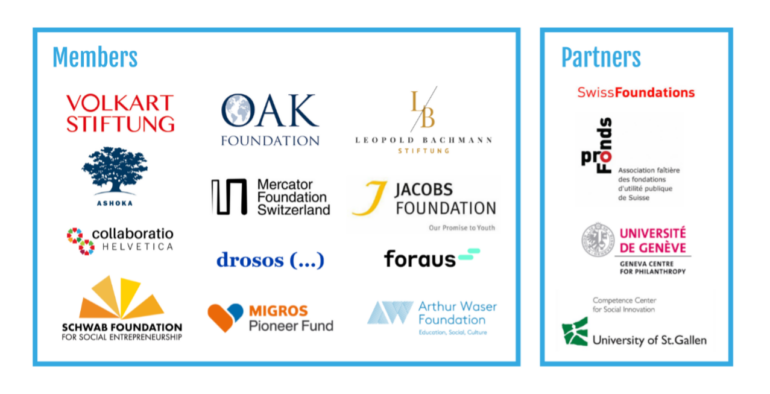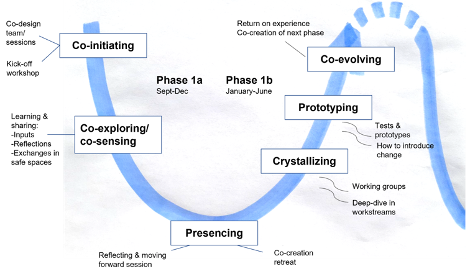For most of us, the situation we’ve been living in for the last two years has undeniably triggered a lot of self-reflection: about the way we live, work, connect with others, etc. It has also given us an experience of what it’s like to fight the symptoms of a social problem (attempts to flatten the curve to keep hospitals working so everyone can be attended to) and pushed us to innovate: teleworking becoming the norm in many companies, school classes happening online, travelling mostly domestically, and so on.
Foundations are no exception. Because of the urgency, they too innovated, for instance by trusting project holders more – less supervision, less reporting. They also deepened their questioning of current practices. ‘Is our work addressing the root causes of social and environmental problems?’ For many, the answer was no.
Swiss foundations are realizing other approaches and practices are needed to achieve long-term social change
In 2020, Ashoka, the world’s largest network of social entrepreneurs, co-authored a global report with Catalyst 2030, Co-Impact, Echoing Green, the Skoll Foundation and the Schwab Foundation for Social Entrepreneurship, which pointed to a key observation: systemic challenges (i.e. biodiversity loss, growing inequalities) require systemic answers, but currently the dominant funding practices are ill-suited to support them. According to the report, the majority of systems change approaches needs more than five years of financial support to achieve their goals – but few funders commit for the long term. Moreover, this support usually comes with many restrictions on how it can be used: 72% of the social innovators who were surveyed reported receiving less than 25% unrestricted funding. Finally, funders seem to actively discourage innovative approaches: 87% of the social innovators reported that they had to adapt their initiatives to comply with funder requirements – 43% of all social innovators reported having to make major changes (Embracing Complexity, 2020).
Collaboratio helvetica, a cross-sector platform and ecosystem for systems change, observed the same issue in Switzerland: the changemakers they support struggle to get funding for their systemic initiatives. Lukas Hupfer, Co-Director of the Swiss youth think tank foraus comments: “Organizations like ours are limited in their development and impact by the mainstream funding mechanisms. Functioning almost exclusively with project funding had us overstretched and running around like chickens at times.”
On the side of foundations, the topic began to gain traction and was discussed at the SwissFoundations Symposium 2020, with Dr. Lukas von Orelli, President of SwissFoundations, saying, “if we dare to push the boundaries of what we thought possible together, we can foster systemic change”. Manuela Balett, Leopold Bachmann Stiftung’s CEO, declared that “how to fund systemic change is a difficult question that preoccupies us and I would wish that as foundations we would address it together, do the needed reflection work”. To address this need, collaboratio helvetica launched a series of workshops and peer learning sessions for foundations, on topics such as participatory grant-making with SKKG and Crantcraft, and core funding with MAVA and Oak Foundations. Clearly, the momentum was there to move from conversations to collective action.
Time for action: embarking on a one-year collective exploration process
In the summer 2021, 12 organizations (see list below) decided to embark on a journey led by Ashoka Switzerland and collaboratio helvetica. Together, we are exploring the topic of how to support systems change, co-learning by sharing insights and best practices, and developing possible new approaches for greater impact.
Over the last two years, we have been reflecting on new strategies and tools how to contribute to societal change on a more systemic level. We realized that punctual project support and bilateral collaboration, even if the projects themself are transformational, is not enough. We need cross-sector collaborations, new creative approaches, and longer-term multi-stakeholder strategies.
Andrew Holland, CEO, Mercator Foundation Switzerland

The process, following Theory U’s methodology, is split into two main steps. We first deconstructed the problem – collective learning – between September and December, before working on possible solutions – co-creation. In the Fall 2021 we looked at the issue from different angles. We deepened our understanding of systems change, sought to operationalize principles for funding systems change in our own organizations, identified the challenges and constraints that foundations are facing, and heard about emerging best practices from peers. Additional actors, including MAVA Foundation, Co-Impact, Fondation de France and International Bridges to Justice (IBJ), enriched the discussions by sharing their expertise and experience too.
As a funder, we are challenged when trying to fund systems change. We need to overcome internal silos and try new funding approaches. I’m excited to be part of this initiative, to learn from each other and define prototypes together.
Adriana Craciun, Senior Adviser – Organizational Development and Capacity Building

What have we learned? 5 key dimensions for funding systems change
We’d like to share our first insights as we believe they might be helpful to others in the ecosystem. Here are five dimensions essential to consider when willing to support systems change:
- Change of mindset
The basis for funding systems change is a change of mindset in social innovators and the different actors within foundations. Without it, any implemented ‘solutions’ are superficial and unsustainable. People working towards systems change need to understand the systems they operate in, including from the perspective of others. We need to put egos and individual agendas aside for our collective future.
- Trust
Trust is at the core: trust between staff members of foundations, between staff and the board, between foundations and social innovators, amongst social innovators, and amongst foundations. Whilst essential to achieve systems change, it is also one of the greatest challenges. Agreements should be tied to learning and impact rather than short-term KPIs, whilst also including support and room for failure and learning.
- New impact measurement and learning frameworks
Supporting systems change requires learning to be a key part of evaluation (e.g. with development evolution or a Learning Ecology approach). Being intentional in learning enables to adapt the strategy towards the vision we aim to achieve. Depending on whether projects aim to address roots or symptoms, adapted learning and evaluation tools need to be applied.
- Eye-to-eye collaboration
Power dynamics between foundations and social innovators need to be addressed, as eye-to-eye collaboration is key to maximize learning and impact. By leading ‘from behind’, focusing on the social innovators needs and honoring their expertise, foundations can become experts in asking the right questions and support their partners. Additionally, foundations can alter their policies and offer complementary support to enable knowledge transfer between social innovators from similar fields and strengthen collaboration. Partnering up with other foundations increases the scale at which systems change work can be done.
- Time – long-term horizon (no quick fixes)
As systems change does not happen overnight, a great deal of patience is required. Foundations, similar to investors in early-stage start-ups, invest in a vision and people they are confident are capable of implementing it. A failed strategy can be the key to finding the ones that do work. It takes courage to provide long-term funding and to invest in the organizational development of partners, yet it is key to enable systems change work.
These five key dimensions may give the impression that what’s needed is clear and moving to implementation a no-brainer. However, we also learned that the devil is in the details. As always with systems change work, there is no ‘one size fits all’ — each foundation will have to assess its impact goals, and design a systems change strategy accordingly. There is high potential if this is done together with other foundations and social innovators from their field. And yet, different constraints, both within foundations and from outside, can complicate or even halt a transition to funding systems change.
We just celebrated 100 project and 100 million. It has been a long learning journey to get to this point. Still, even if our impact matters and there are inspiring stories, there is a long road ahead. We are ready to take it to the next level and I see this initiative as an opportunity to do so together.
Stefan Schöbi, Managing Director, Migros Pioneer Fund
In order to move forward, the pioneering foundations and social innovators part of this group will work on different prototypes together. Until June, we will test innovative grantmaking processes, launch new research on systems change, define new models for learning between foundations and social innovators, and collaborate around education.
Our foundation is in a strategic process, and seeking new paths to increase our impact. I believe this initiative will be a learning journey that will provide valuable insights and support us.
Chantal Perrothon, Project Manager, Drosos Stiftung
We are now buckling up for the second part of the journey. Would you be interested in joining this collective process or collaborate on any specific topic? Contact any of the co-authors for further information. We are looking forward to the next steps in this inspiring and important development in the Swiss philanthropic sector!


